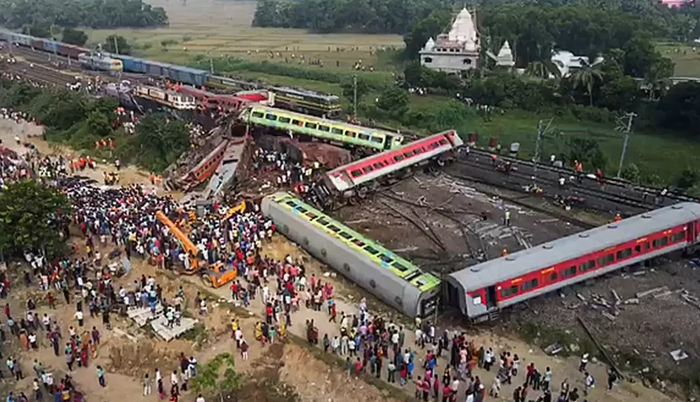![]() Home > Asia
Home > Asia
Odisha Train Crash: Why Do Trains In India Go Off Tracks?

AFP
![]() June 4th, 2023 | 08:23 AM |
June 4th, 2023 | 08:23 AM | ![]() 232 views
232 views
INDIA
There are many unanswered questions on what exactly led to a deadly multiple train collision in India on Friday evening that killed at least 261 people and injured 1,000.
Two high speed passenger trains and a freight train were involved in a "three-way accident" near a small station in eastern state of Odisha, according to reports. One of them collided into the stationary freight train, and its coaches flipped over to a third track, causing an incoming train to derail. Only a comprehensive inquiry will help uncover the truth behind the incident. Yet it has once again ignited fresh concerns regarding railway safety in India.
India's expansive railway system, renowned as one of the world's largest, transports over 25 million passengers annually across a countrywide network of tracks spanning more than 100,000km (62,000 miles). Some 5,200km of new tracks were laid last year, according to Railway Minister Ashwini Vaishnaw. Also 8,000km of tracks were also being upgraded every year, the minister said.
Mr Vaishnaw recently revealed in an interaction that the majority of the tracks were undergoing upgrades to accommodate trains running at speeds of up to 100 kmph, a substantial portion was being enhanced for speeds of up to 130kmph, and a significant segment was being prepared for the high speeds of up to 160kmph.
Clearly, this is part of the government's plans to run quicker trains across the country - a high-speed line is being built between the financial capital of Mumbai and the city of Ahmedabad.
Yet, derailment continues to be a "bugbear for the railways," a former railway board chairman, Vivek Sahai, told me. A train can derail for a number of reasons - "a track could be ill-maintained, a coach could be faulty, and there could be an error in driving".
A government railway safety report for 2019-20 found derailments were responsible for 70% of the railway accidents, up from 68% the previous year. (Train fires and collisions came next, responsible for 14% and 8% of the total accidents respectively).
The report counted 40 derailments - 33 passenger trains and seven freight trains - during the year under review. Of these 17 derailments were caused by track "defects" - this could include fractures and subsidence of tracks.
Only nine incidents of derailments were caused because of defects in trains - engines, coaches, wagons - according to the report.
Railway tracks, composed of metal, undergo expansion during the summer months and contraction in winter due to the fluctuations in temperature. They require regular maintenance - tightening loose track components, changing sleepers and lubricating and adjusting switches, among other things. Such track inspection is done by foot, trolleys, locomotives and rear vehicles.
India's railways recommend that track recording cars meticulously evaluate the structural and geometrical integrity of tracks designed to sustain speeds ranging from 110kmph to 130kmph at least once every three months.
A report on derailments by federal auditors between April 2017 and March 2021 had some disturbing findings:
There were "shortfalls ranging from 30% to 100% in inspections" by track recording cars required to assess the geometrical and structural conditions of the tracks, the report said.
A study of 1,129 investigation reports of derailment accidents found that two dozen "factors were responsible.
A major reason for derailments was related to maintenance of tracks (171 cases), followed by "deviation of track parameters beyond permissible limits".
More than 180 cases of derailments were due to mechanical reasons. More than a third of them were due to defects in coaches and wagons.
"Bad driving and over-speeding" were the other major factor responsible for derailments.
Only an investigation will find out why the Coromandel Express derailed. There has been a lot of talk on anti-collision devices to be installed on Indian trains, but the system is now only being installed on two major routes - between Delhi and Kolkata and between Delhi with Mumbai - according to a railway official.
In 2010 more than 150 people were killed when a passenger train derailed and collided with an oncoming freight train in West Bengal. Investigators said Maoist revels had sabotaged the track causing the Kolkata-Mumbai passenger train to derail, throwing five of its carriages into the path of the oncoming good trains. There has been no hint of a sabotage yet in Friday's accident.
According to the railways, there were 34 "consequential rail accidents" - collisions, derailments, fire or explosion in trains, road vehicles colliding with trains at level crossings - during 2021-22, up from 27 such accidents during the previous year. The Hindu newspaper reported on 31 May that the number of such accidents had risen to 48 in 2022-2023.
Presciently, the report said the railway authorities were worried about the rising accidents, and had asked their senior manager to "critically analyse long working hours of crew especially in East Coast Railway and South East Central Railway, and take corrective action urgently". The site of Friday evening's accident happened in the region of East Coast Railway zone.
Source:
courtesy of BBC NEWS
by Soutik Biswas
If you have any stories or news that you would like to share with the global online community, please feel free to share it with us by contacting us directly at [email protected]